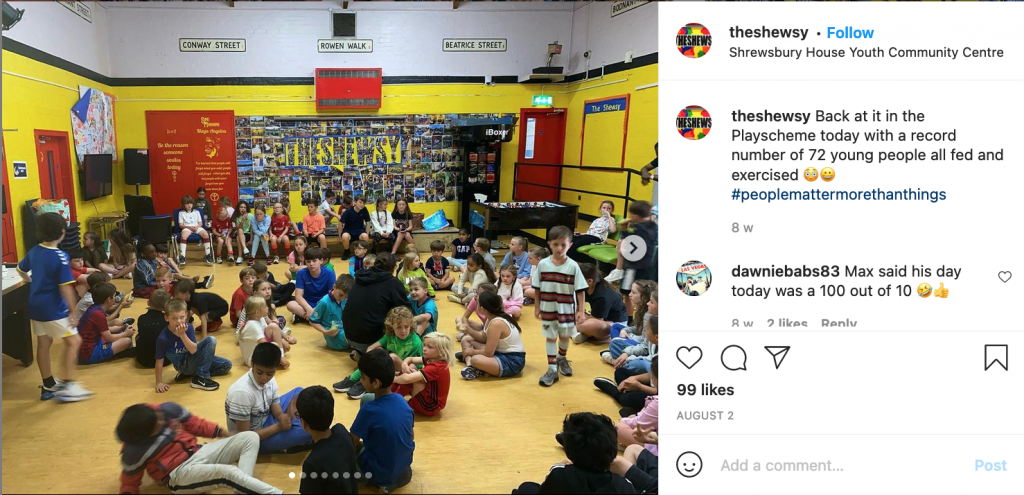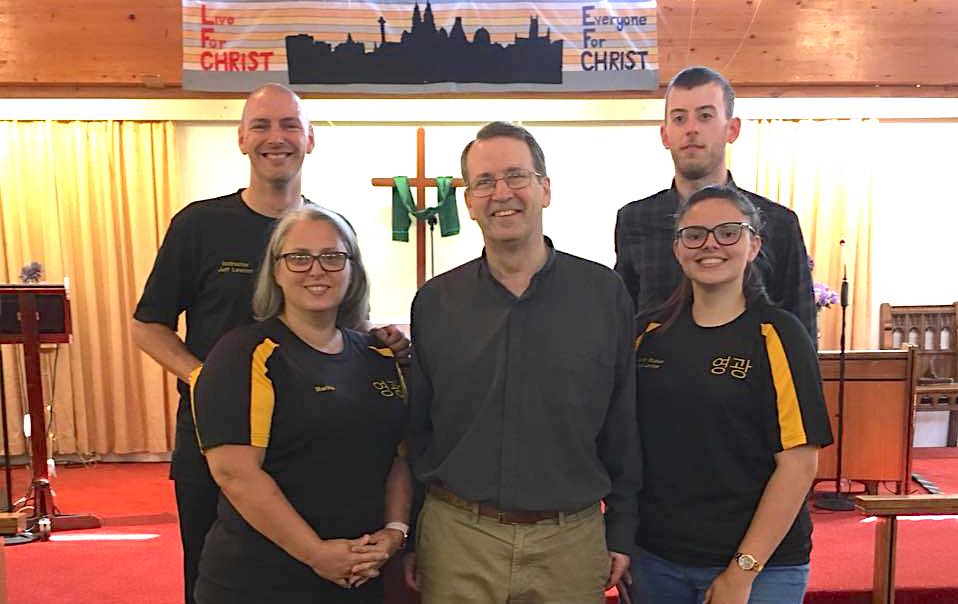Leadership for the Long Term: Affirming the Value of Staying
Henry Corbett‘s story is a powerful testimony to the faithfulness of one man’s long-term commitment to place, an expression of love. This is leadership not in terms of career, management or administration, but a Christ-like ministry that is fundamentally covenantal, about relationship, loving and accompanying people in all the detail of their lives.
“You’ll only be here 5 minutes and then you’ll **** off like the police inspectors, the social workers and all the others…”
That was said to me in my early days as an ordained minister in Everton alongside other similar comments to the same effect. Unsurprisingly, such comments stayed with me.
To put it another way: it was the concern of residents in the parish that professionals would come into the area – social workers, police officers – and local people would welcome them, get to know them, help them understand the community and local cultures. Then just when residents felt that maybe these social workers or police understood the community, off they would go to another posting with ‘Three years in Everton’ on their CV. ‘Just as we get to know them, they go off…’ locals would say. Or, More telling, ‘Just as we think we’ve taught them our ways they move off and we have to start all over again. We think, ‘What’s the point?’ when another person takes over from them. Why can’t they stay longer?
In some cases, of course, local people would be glad to see the back of an unsympathetic social worker or a judgemental police officer and yes, there have been cases of those. ‘My job is to get rid of these scrotes any way I can’ said one newly arrived police inspector many years ago to a community lunch the church had laid on. That comment damaged relationship and we were glad to see the back of that inspector. I hasten to add that many other police inspectors have been keen to listen, made good links with local community leaders and we were sick to see them move on. Could not the listening, respectful ones stay, especially when they had earned the trust of the community?
In the case of clergy and church leaders it is of course not always right for vicars to stay on in places for a long time. Personalities and parishes vary, and short- and medium-term ministries undoubtedly have their rightful place. I want to affirm the value of a listening ear to the voices of the community, and for some leaders the option to move is not always present, whether because of lack of opportunity or because their partner may have a job or role in the area that is highly valued, or because the children are at an age where to move would be counterproductive, even seriously damaging. For such clergy to feel they are in some way inferior because they are staying rather than moving is not for a moment helpful. ‘Are you still there at St X’s?’ is sometimes said with an unmistakable pejorative tone, as if you are still there because not good or rated enough to move.
I came to Everton in inner-city Liverpool in 1978 to work as curate. In 1979 I had married Jane, whom I had met years earlier when we were both helping as volunteers in Shrewsbury House. I was installed as Rector of St Peter’s and Warden of Shrewsbury House at a service at St Peter’s, with three emptied-out tower blocks looming over the church. The congregation were pleased that Jane and I, people they knew, would be continuing to support the fight for our West Everton community. Local people felt they had been listened to and that the work of standing up for what would be best for the area could continue with a couple who knew the situation and the recent and more distant history, and who would work with the people, not at them.

Working with the people, not at them
‘You owe it to your parish to take six weeks’ holiday a year and a day off each week and to have family time 5-7pm over tea’ were instructions from Bishop David Sheppard when I was a curate, ‘and if people are surprised by six weeks’ holiday you can remind them that many people work five days a week with two days off at the weekend whereas you work six days a week with one day off and that means fifty-two less days off!’ You can see I remembered those words and I have always thought I need to be fresh for ministry rather than worn out by lack of rest or refreshment.
I am still Rector of St Peter’s, Warden of the ‘Shewsy’ (as it is affectionately known) and now also vicar of the neighbouring St John Chrysostom Church Centre in Everton. I also became chaplain to Everton Football Club’s training ground. I was advised ‘It will be good for you to have something outside the parish, something different…’ That chaplaincy has also been long term, stretching back to Howard Kendall’s first stint as manager: ‘My players may have problems,’ he said, ‘but they won’t always come to me as I’m picking the team. First-team players may be a bit wary of you as they have lots of people wanting a bit of them: so start with the apprentices and then when they are in the first team they will know that you are genuine and trustworthy and can pass that word round to the others.’ Wise advice: he did not want my chaplaincy to be short term, just as local Everton residents did not want a listening police officer, social worker, housing officer, GP or vicar to be short term.
I love the Church of England parish system. Every church – Anglican or not – has a community or communities in which they are placed and which, with God’s Spirit’s help, they will seek to love and serve, but the Anglican church has a responsibility for everyone in a particular geographical area. Wherever you travel in England you are in a parish.
Every parish is of course different and has its own distinctive features, culture or, increasingly, cultures. It is certainly not ‘one size fits all’, ‘one style fits all’ or ‘one length of term of leadership fits all.’
There was an understanding for some Anglicans in days of old that when a minister made it to their incumbency that was where they would serve their ministry until retirement. Such a view had its obvious problems, maybe hinted at in that hopeless word ‘incumbency’: it sounds as though it is where you lie down and go to sleep. Was that true in some sad cases?! More seriously, not every context or parish lends itself naturally to an extended ministry.
Likewise, whether for reasons of the vicar’s liveliness and freshness or because of the parish’s need for new leadership, or for other factors such as health, family concerns or responsibilities, long-term ministries clearly do not fit every situation.
What if short-term ministries communicate a lack of commitment?
But do long-term ministries fit some contexts? What if, as in the case of the Everton community of the 1980s, an area is in the midst of extensive, controversial change and turbulence and continuity would be valued by the community? What if short-term ministries communicate all too powerfully a lack of care, commitment and listening?
What if the church community value their minister and leader and want them to stay on after five to seven years, and their reasons are not just selfish and unimaginative (‘Better the devil/vicar you know’)? What if they feel that their vicar or leader moving on would send out a message of an uncaring church? Would they feel that they are just being used as a stepping-stone for the person’s career as the minister moves on ‘up’ to a ‘better’ post and situation?

What if the leader of the church has been preaching on the value and importance of every individual from Gen 1.28, a value that insists no one’s views should be ignored? For their minister to move or be moved without any reference to their views would be a contradiction of their understanding of an application of that verse. An oft-repeated motto in Everton was, ‘Who does it affect? Consult them!’ Then, after consultation by some groups was not being taken seriously, it became, ‘Who does it affect? Involve them’ and more recently still the powerful phrase, ‘Nothing about us, without us, is for us.’ I remember a local person saying, ‘We are seen to be the little people as they take their decisions about our area.’ She had come to a determined Christian faith that believed that God did not see people that way, and that her views and those of her neighbours should be taken seriously and would contribute to better decision-making.
I remember it being said at a gathering of ministers, ‘When you go to a new church make the decisions you know you will have to make at the start: it will only be more difficult to make them later.’ I have always questioned the wisdom of that advice. It seems disrespectful to the people and context you are moving to. The leader who does not take time to listen, to understand the various backstories, to appreciate the tensions, hopes and fears, is a leader who is likely to quickly antagonize local people inside and outside of the church.
Understanding a parish or area and its people is not achieved from a quick briefing from a parish/area profile, written to recruit a new minister. Who put the profile together? What was their agenda? How much did they know about the area and its context? Do they know about what other churches and organizations are doing in the area?
Responding to local needs
In Everton in the 1970s the state of housing was a strong local concern. The Arkwright estate with its maisonettes and flat roofs was very damaging to residents’ health. ‘Come and look at my child’s bedroom: damp down the walls,’ I would be told on visits. The newly built Radcliffe estate may have won an award for its imaginative layout based on a Cornish village, but local people were not consulted or involved in its design and it soon proved to b a disastrous rabbit warren of an estate. There was no place for a car to be parked anywhere near a house or flat: the idea of parking it outside the estate and walking a distance to your home would not have got approval if the architects had thought to avail themselves of local wisdom. And when the heroin trade came to the estate in the 1980s the warren was perfect for the minority who were dealing such drugs to escape the pursuit of any police officer.
What should a church leader do in a situation crying out for better housing, for better health, for better safety in the face of illegal drugs that were bringing with them burglaries and gang threats around territory? Sermons in church spoke of a God who cares about all of life, and a church leader could surely not step aside and pass by on the other side. Vital to effective leadership in that situation is to understand as best you can the true situation, listen to local wisdom, and also crucially to work with others in addressing the situation.
All that can take time. a short-term leader is less likely to appreciate the situation, the issues, the potential allies and the history. In the case of the Radcliffe estate, it was important to work with West Everton Community Council, a group that was resident-led and had the confidence of local people. Then it was important to be at the meeting of residents from the estate to talk about a way ahead. The view from the police was that nobody would come because of intimidating threats from the drug dealers against any who might attend such a meeting. The small group of us who set up the meeting hoped maybe 10 or 12 people would come. Over 100 people bravely attended, and arrived at a consensus that the priority was to address the universally felt housing need, not the more dangerous drug-dealing. Both the Catholic priest and I were involved, along with other Christians from both churches and others with no church affiliation. It was a community campaign with the churches’ support, not a churches’ campaign, and was all the stronger and more effective for that reason.
Those community links and links with other local churches can take time to build up. Another minister with a long-term ministry writes in a letter, ‘It was over time that we built deeper relationships with other ministers and their congregations and that enabled us to work more closely on some projects. Over time you engage more deeply with the community and understand how it works better. You develop quick ways of learning information: you get insider information and people trust you to work with them.’
‘Over time you build trust and understanding; and begin to overcome suspicion. When I first arrived and started walking round the parish in my dog collar I would smile and say hello to people. Some used to cross the road to avoid me! Five or ten years later the same people would cross the road to have a chat. Some even ended up in church. Mutual trust and respect are earned, and that protects you from doing things to people rather than with them. You engage more deeply with the community and understand better how it works. You develop short cuts for learning information and getting things done. People appreciated the fact that they could depend on our presence and contribution: the contribution of our church and other local churches became wanted and valued.’

Trust matters in times of crisis
Another long-term minister has spoken to me about the importance of his being around in the community at times of crisis. When there were frightening riots in his parish, he was able to speak both to the police and to local residents and be a trusted bridge-builder and pastor to both. He was also glad to have been around for some years in the church when there were some tragic suicides, which deeply affected the church membership. At such times an understanding of something of the history, with bridges already built with the participants, the families, those closely involved, is of huge pastoral and missional help.
The earning and keeping of trust can take time at the everyday level of personal relationships within the church and outside the church, with individuals, families and friends’ networks. A long-term ministry means that you can be at the confirmation of the child you baptized, and you can be at the funerals of the couple you married. You can be filling in the passport form or reference for someone you had in your Shewsy Under 12 football team and who then got caught up in trouble but is now out of prison and is renewing contact with his children.
Such continuity earns trust, makes the conversation more engaging and honest and so helps the pastoral ministering. Another person you knew as a teenage in the youth club is in church in his 40s – in part because of positive contact 25+ years before. You understand more of the family networks, the barriers, the openings, the people of peace and the people of not so much peace. You have seen with your own eyes people change. The young person who Jane and I recognized and found stuck trying to climb in through our vicarage window in search of some cash for drugs not only appreciated the mug of tea we gave him after he had extricated himself from the narrow window but came to the Shewsy youth club and never got into illegal drugs again.
Leadership is about enabling leaders and ministries
Within the church, the value of – or even just the potential for – a long-term ministry can be important for trust and for wise decision-making. A church that believes its minister and leader is looking for their next move is not likely to be a church with full confidence in that minister’s decision-making and their commitment to the mission of that church. Knowing the backstories of your church members in some depth is a firm base for good decisions, enabling their ministries to flourish. A new minister can be more easily taken in by someone eager for power and influence, for less than Christian motives, than the minister who has been around for a while and who is likely to have seen the person in action over a period of time. This minister will have a handle on who can give wise advice on their suitability for leadership or a particular ministry. Leadership is very much about enabling and training other leaders. This can take time and is better for having someone who is committed not just for the long term and who has some experience of both the person being considered for a role and the context.
There are of course very clear dangers. Long-term leadership should always be ‘open to move, open to stay,’ and an alert leader should be a good listener to themselves, their closest family and friends, and to their colleagues, parish and community. Staleness and exhaustion are obvious dangers for long-term ministry and each person will or should have their ways of staying fresh, energized and with an appetite to learn more of our wonderful God and more about our changing community or communities. There is the need graciously to say ‘no’ to things that should not be priorities. Being long term in an area can bring an increasing number of issues and people to your door, but being aware of other support systems in the area can help us signpost people to others.
Each of us is different in temperament and interests and different things will energize or exhaust us. For me, the two home groups I go to each week, studying a passage of Scripture, reenergize me. These times with people help me learn about their lives and how God is at work in them.
I also learnt early on the job to prepare for a visit with a moment to pray ahead and think what question would help both them and me. In terms of staying alert to the context, in Built as a City, Bishop David counselled ‘enjoy the area’, and those words too have stayed with me. Every area has its stories. ‘What are people angry about?’ was a question a Catholic priest told me he would often ask himself as he prayed for his community.
In a leader’s ministry, awareness of those changes in people and culture is important alongside the changes in the streets and environment. Each autumn I enjoy offering a free accessible apologetics course. Every year the questions and issues vary, and the film clips, diagrams and quotations vary. The group changes with now between 10 and 20 people coming over three weeks: they keep my thinking about the most important questions regarding the Christian faith fresh: is there a God? Is there any evidence? Who is this Jesus? Why is there so much injustice, so many sad stories alongside love, joy and the great stories? What is life about?!

Listening to people is part of a leader’s discernment process
Staying in a long-term leadership role can also keep your preaching fresh. If you stay in a church long term you cannot just repeat sermons. You need to approach the text or theme with eyes into the ever-new situation that the congregation is facing. The prophets Amos and Jeremiah challenge a whole system that is creating injustice and is bolstered by complacency, and it is easier for a preacher to be bringing those prophetic messages when they have earned some trust and credibility. Jesus took thirty years experiencing life in Galilee before he embarked on his preaching, teaching, healing and training ministry.
I am not arguing that everyone should go for long-term ministry or that long term leadership is always best. But I am keen to propose that listening to people, within the church and outside the church, should be part of a leader’s discernment process and of their bishop’s or church overseer’s discernment too. Not to do so is to discount the wisdom of people made in God’s image and to marginalize them.
I came to Everton to love and to serve, to listen and to lead, and to live out and share the greatest news in the world. I knew in my thoughts and prayers that the local people should be listened to, by politicians taking decisions about the area and also by church leaders taking decisions about the church’s leadership. Communities value stability and continuity: long-term leadership offers that. Church congregations and local communities deserve to have their voice heard.
© Henry Corbett
Henry Corbett is Vicar of St Peter and St John Chrysostom, Everton, Warden of Shrewsbury House and Chaplain to Everton FC. He has lived and worked in Everton since the 1970s.
This text has been abridged from Leadership for the Long Term – a Grove Booklet (#L41), available to order here for £3.95. It is shared here with the kind permission of the author and Grove Books.
Photos courtesy of the Shewsy.
This essay was featured in T4CG’s Autumn 2021 Newsletter.

